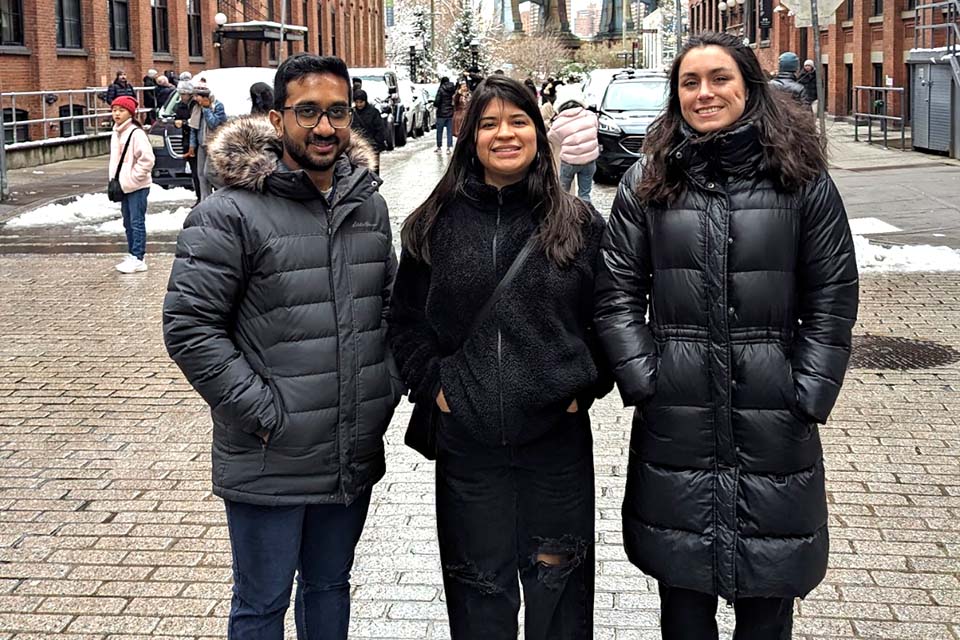Career Development for the Sciences Group Helps GSAS Students Explore Options

April 17, 2024
Abigail Arnold | Graduate School of Arts and Sciences
While Division of Science graduate students are hard at work in their labs, they’re also beginning to think about their plans for life after graduate school. Here to help is the Career Development for the Sciences (CDS) group, which organizes programming, including workshops and many guest speakers, to help students get a sense of the many paths available to them and the skills they need to get there. Fourth-year Molecular and Cell Biology PhD student Marissa Ashton, third-year Molecular and Cell Biology PhD student Sayan Biswas, and fourth-year Neuroscience PhD student Jazmin Morales lead the group, which was also included under the Neuroscience Program’s training grant. GSAS spoke to Ashton about CDS’s programming and what students can take away from it.
This interview has been edited for clarity.
How long has CDS been around? Who is involved in the group?
It’s been around close to ten years. It died down a bit and then was revived by Meghan Harris and Travis Kyani-Rogers (both PhD ‘22 in Molecular and Cell Biology), and then I took over when they graduated. The group ebbs and flows depending on who’s leading it. Currently, since those of us who are leading it are all from Molecular and Cell Biology or Neuroscience, those programs have a larger presence since we know the people from them best. But it’s open to people from all science graduate programs, and we try to make it oriented to them all.
What kinds of programming do you organize? How do you find guest speakers to come in?
We mostly invite speakers, which is an easy way for students to hear about people’s first-hand experiences of getting, having, and changing jobs after their PhD programs. They present, and then we have a question and answer session. We also have some workshops -- Marika McCann from GSAS Professional Development is great and comes and does resume and LinkedIn workshops. Usually twenty to thirty people come to our events -- food also helps, I must say. If it’s at an easy time to get food, people love that.
Our speakers are a mix of different people who current students know and would like to invite to talk. A good number of them are alums who people know through their labs, and they’re usually happy to come back and give back to their programs. Students also know other people who are working in cool places and who are happy to come talk. There’s a typical trajectory that a lot of people take after the PhD, going to work as bench scientists at various biotech companies. But we try to bring in a whole range of people, like those working in communications and other areas that people don’t traditionally think of traditionally as a post-PhD career. I think it’s important to holistically analyze all your options, even if you don’t know they exist at first.
Why do you think career development resources are especially important for graduate students?
In a PhD program, you are very much oriented towards your individual research and not thinking about the hard and soft skills that you need to find a career you’ll be passionate about. This group helps you focus on getting a job and finding a job you actually like. In the group, you also get to do networking, which we don’t do as much of in academia. For example, you can have the chance to reach out to potential speakers and make connections.
What advice would you give to graduate students in the sciences about exploring careers?
You’ll never be sure you’re picking the exact career you want, but the only way to be confident you’re picking a career you’ll like is to explore as many options as possible. It would be great to explore all the career options firsthand, but since that’s not feasible, hearing about others’ experiences and finding out what they like or dislike is the next best option. Then you can compare the different careers to your own likes and dislikes to piece together what you want.
What advice would you give to students who want to get involved in a leadership role?
We’re always open to having people join CDS and give their input! We’re a pretty open group. I’ll be graduating at some point, so we’ll need new leadership then.






